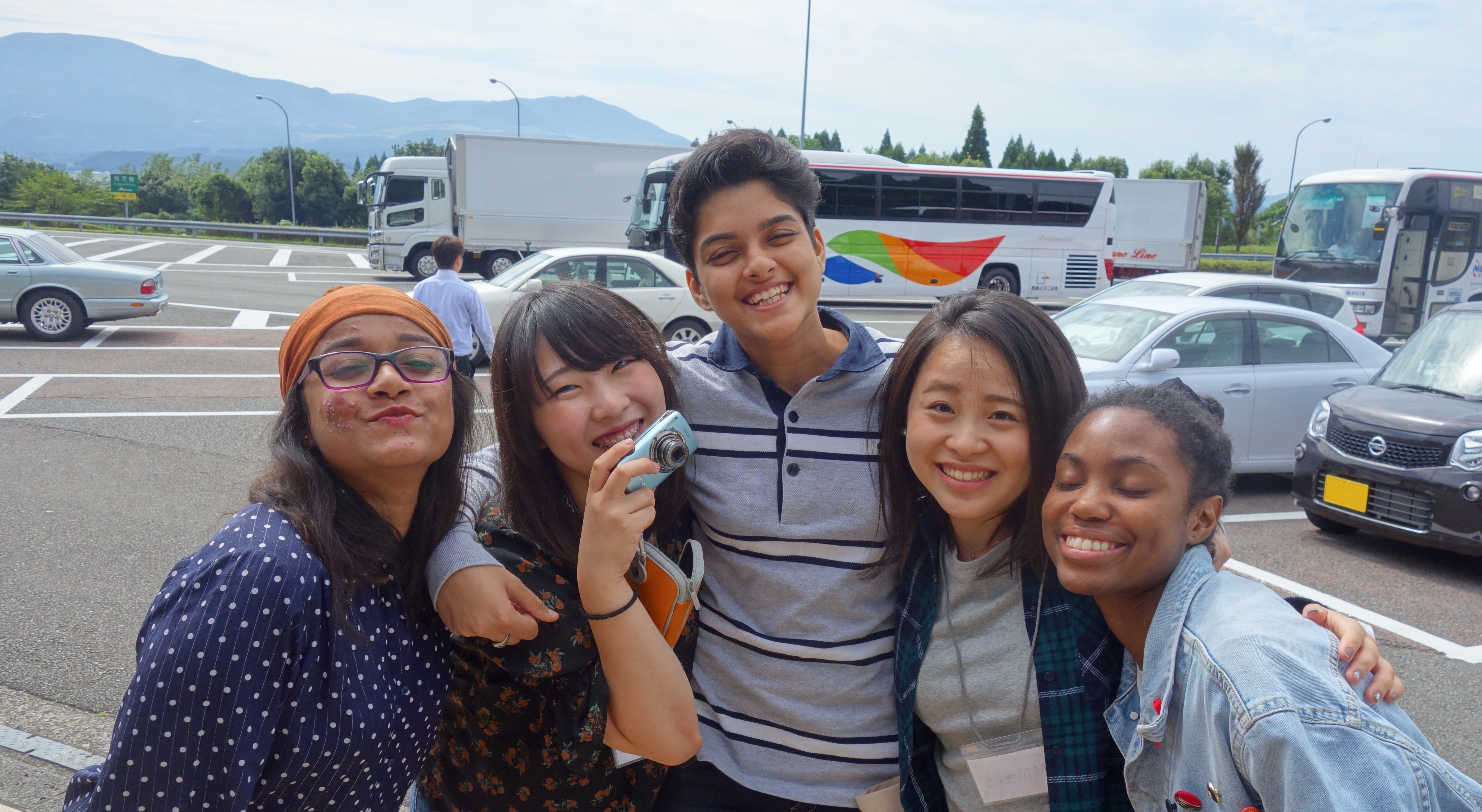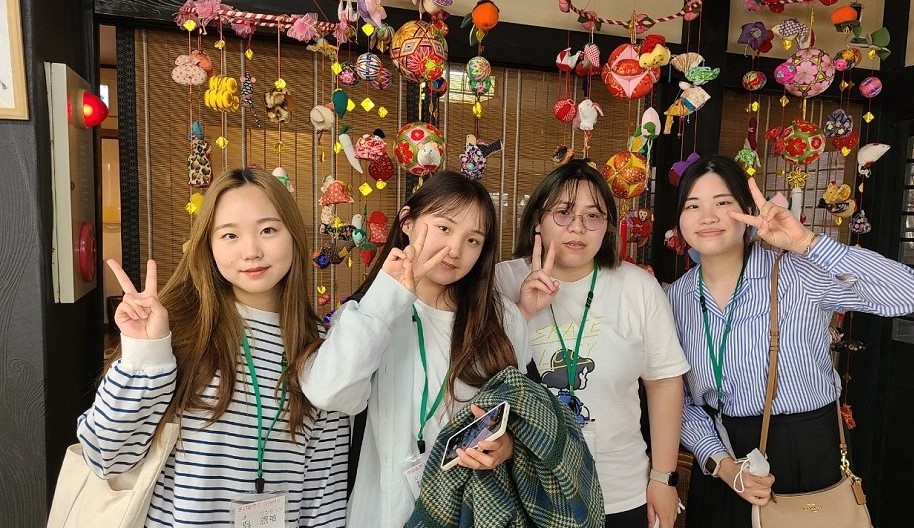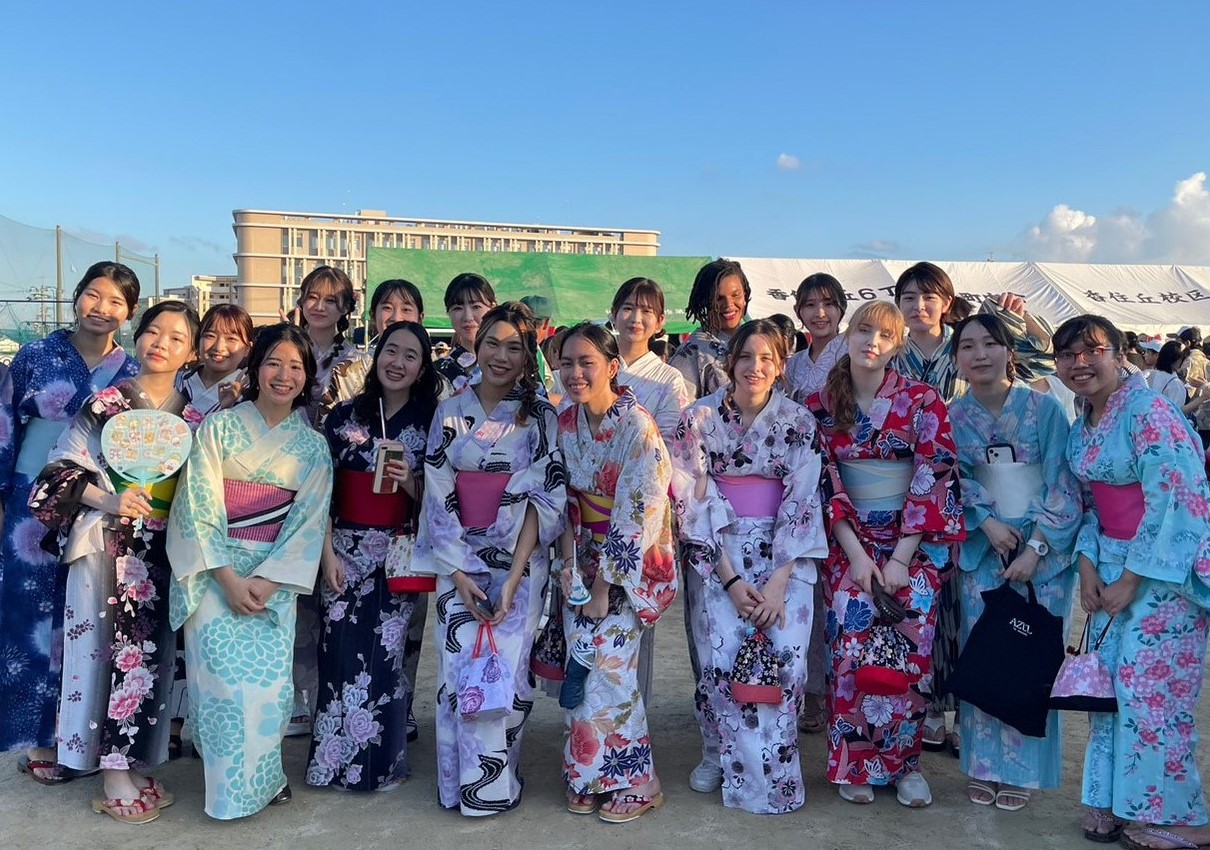Inbound Study Abroad Programs
The World of Japanese Contemporary Culture Program (WJC)

WJC is a short-term study abroad program designed to provide a unique educational experience focusing on Japanese culture and society. Its medium of instruction is English. Students have the choice to attend the program either for one semester or for a full year. Japanese language classes are available at various levels and students are able to take classes depending on their level.
Various excursions and events such as field-study trips, special lectures by guest speakers, and symposia are organized. The home visit program (visiting a local Japanese host family on weekends) and the Japanese student “buddy” program (JD-Mates) provide WJC students with good opportunities to socialize with students and residents of Fukuoka.
WJC offers three elective tracks as below. WJC students will sign up for one of the three options.
JLC: Japanese Language and Culture
JCS: Japanese Contemporary Society
JCC: Japanese Contemporary CultureAll courses in JLC are taught in Japanese, while all courses in JCS and JCC are taught in English. Each course is for 2 credits (30 hours). To apply for WJC, you must be able to provide evidence of your spoken and written command of the English language (TOEFL-iBT 72+; IELTS 5.5+; CEFR B2+). For the Japanese language and Culture (JLC) track, the level N2 of the Japanese Language Proficiency Test (JLPT) or above is required in addition to sufficient English language skills.The following courses are planned to be offered. (Couses are subject to change.)
Course Offerings
JLC Course
?日本文化?博多学入門Ⅰ
?博多学
?アートとグローバリゼーション
?ポップカルチャーが表像する現代日本社会
?宮崎駿の世界-日本アニメの文化人類学的考察
?観光人類学で見る日本の観光-地方都市の可能性
?ジェンダーと日本社会
?食文化研究JCS and JCC Course
?Introduction to Japan and Hakata* Studies I: History and Culture
?Topics in Hakata Studies: History and Culture
?Hakata History and Tradition through Festivals
?Contemporary Japan through Popular Culture
?Reading and Writing Japanese Stories
?Reading Lafcadio Hearn (Koizumi, Yakumo)
?New Japanese Cinema: 1980s to Present
?Studying Japanese and Western Narratives through the Films of Hayao Miyazaki
?Introduction to Japanese Cinema: Silent Era to Bubble Era
?Japan without Japan
?Studying Anime and Manga
?Modern Architecture and Urban Space in Japan (1900-present)
?Modern Japanese Art Material, Tradition, and Global Context
?Gender in Contemporary Japan
?Gender in Modern Japanese History and Society
?Memory and History of World War 2 in Postwar Japan
?Introduction to Japanese Philosophy
?Food and Environment in the Modern Japanese Society
?Comparative Food Culture
?Global Issues in the Contemporary World
?Environmental Issues and Policies in the Globalization
*‘Hakata’ is the old name of the central area of Fukuoka City.Independent Study Project (ISP)
All WJC students take an ISP to research in depth a topic in Japanese culture of their own choosing under faculty supervision. Students are required to submit a written report and give an oral presentation each semester. (2 credits)
Study Trips
Various study/field trips, providing exposure to Japanese contemporary and traditional cultural sites, are organized by WJC. Destinations include museums, Shinto shrines, a Kabuki theater, Kyushu Grand Sumo Tournament, Hakata doll painting experience, etc.
Credit Transfer
Credits and grades earned by WJC students may be transferred to their home universities. Each case of credit transfer needs to be authorized by the home university.
Accommodation
WJC students are guaranteed accommodation in the University’s Nadeshiko Dormitory. Each unit of the dormitory has four single bed rooms, one dining area with kitchen, one lavatory, and one bathroom. WJC students will live together with Japanese students in one unit.
-Monthly charge: 9,900 yen (for utility expenses)
-Room cleaning: 14,300 yen for moving into the dormitory
-Linen rental: 21,000 yen for 1 year / 12,000 yen for 6 monthsFinancial Support
WJC students may be granted a scholarship funded by FWU. A scholarship includes a monthly stipend and reimbursement for a round-trip airfare between your home and Fukuoka.
JD-Mates (student tutors)
Japanese FWU students participating in the WJC buddy program are called JD-Mates-WJC. JD-Mates-WJC provide one-on-one assistance to WJC students and help them to settle in and find ways to be actively involved on campus. JD-Mates-WJC can also offer linguistic support and cultural guidance.
Application
You can apply for WJC as an exchange student if you are studying in one of our partner universities.
General Information
Application Materials Fall 2024-Spring 2025 Course Description Feedback from WJC students WJC Pamphlet Contact
The World of Japanese Contemporary Culture Program
Fukuoka Women’s University International Center
1-1-1 Kasumigaoka, Higashi-ku, Fukuoka, 813-8592, Japan
Tel: +81 92 663 4005
Fax: +81 92 692 3208
international1@fwu.ac.jp
Student Exchange Program in Japanese (ExS)

FWU welcomes exchange students from our overseas partner universities. You can stay for one semester or a full academic year, to study from a range of modules taught on our undergraduate and graduate programs. (All courses are taught in Japanese.) Further information for exchange students at FWU, please contact an office for study abroad at your home university.
Japanese Language Requirement
You must be able to provide recent evidence that your spoken and written command of the Japanese language is adequate for the programs taught in Japanese for which you have applied. In principle, JLPT N2 or above is required. (FWU offers an exchange program taught in English, The World of Japanese Contemporary Culture Program (WJC). WJC requires no Japanese language proficiency (except the Japanese Language and Culture Course module). Please see above.
Accommodation
Exchange students are guaranteed accommodation in the University’s Nadeshiko Dormitory. Each unit of the dormitory has four single bed rooms, one dining area with kitchen, one lavatory, and one bathroom. Exchange students will live together with Japanese students in one unit.
-Monthly charge: 9,900 yen (for utility expenses)
-Room cleaning: 14,300 yen for moving into the dormitory
-Linen rental: 21,000 yen for 1 year / 12,000 yen for 6 monthsAcademic Calendar
Spring Semester
Arrival Date: late March
Orientation: late March
Beginning of Semester: early April
End of Semester: late July
Examination: mid-late July
Fall Semester
Arrival Date: mid-late September
Orientation: late September
Beginning of Semester: late September
End of Semester: mid February
Examination: eary-mid FebruaryJD-Mates (student tutors)
Japanese FWU students participating in the buddy program are called JD-Mates-ExS. JD-Mates-Exs provide one-on-one assistance to exchange students and help them to settle in and find ways to be actively involved on campus.
Application
You can study at FWU as an exchange student if you are studying in one of our partner universities.
Contact
Fukuoka Women’s University International Center
1-1-1 Kasumigaoka, Higashi-ku, Fukuoka, 813-8592, Japan
Tel: +81 92 663 4005
Fax: +81 92 692 3208
international2@fwu.ac.jp
FWU International Summer Program

Overview
The FWU International Summer Program is designed to provide students from FWU's partner universities with an introductory course to understand Japanese Society and Culture in an International Context, along with interactive activities with local peers. The program is held for two weeks early in August. Approximately 30 students from partner universities will study and experience life in Japan together with local students.
Who can apply?
We welcome applications from female students enrolled in FWU's partner universities, who and in good academic standing with a grade point average of 2.3/3.0 or higher and proficient in English for academic purposes (at least TOEFL iBT61 or the equivalent). Your university needs to nominate you to FWU. Please contact your university's study abroad coordinator.
For more information, please contact international1@fwu.ac.jp
EAT - Eastern Asian Tales of Food
Overview
EAT is a joint program organized by Ewha Womans University, Mahidol University, and FWU. A two-week program for students from the three universities to extensively reflect upon Asian food cultures.
EAT is a specialized summer study program that explores traditional and modern Asian cuisine and culture through field trips and special lectures all taught in English in Bangkok, Thailand and Fukuoka, Japan, home to both centuries-old and modern avant-garde culinary styles. Over the course of two weeks, students will immerse themselves in history and contemporary culture to learn and reflect on the complexities of modern Asia. Students will gain a clear understanding of the role of culture and history in shaping Asian societies and what is currently driving them forward.Who can apply?
Female students enrolled in Ewha Womens University, Mahidol University or FWU. The program is taught in English. No Thai, Korean or Japanese language skills are required.
View 2023 EAT Program
